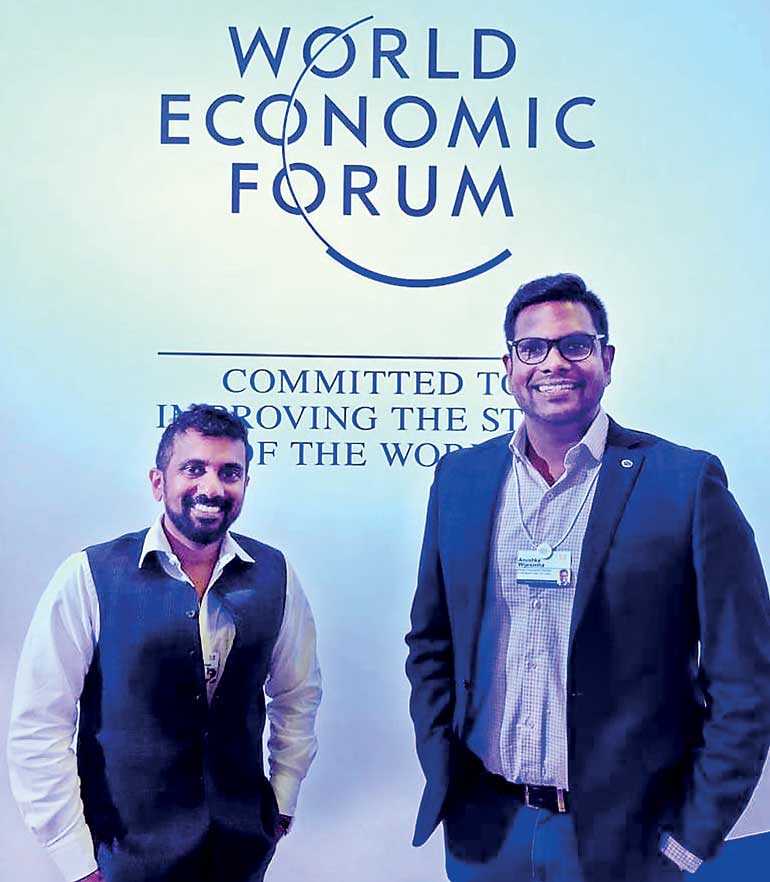Sunday Feb 22, 2026
Sunday Feb 22, 2026
Thursday, 4 October 2018 00:00 - - {{hitsCtrl.values.hits}}

By Lahiru Pathmalal
The World Economic Forum’s 12th Annual ‘Meeting of New Champions’ was held in Tianjin, China recently. Dubbed the ‘Summer Davos’, the summit focuses on the latest in digital, science and technology, innovation, and driving inclusive growth in the fourth industrial revolution.
Takas, Calcey Technologies and a representative from the Ministry of Development Strategies and International Trade were picked to attend this year’s event. It brought together some of the most innovative companies, and some of the best minds in the world to one location. The likes of Jack Ma (Alibaba) attended the event.
Sri Lanka at cross roads
There is no doubt that Sri Lanka faces some major challenges. Some issues that are highlighted constantly in media by citizens and policymakers are:
1.Appreciating US Dollar
2.Over-reliance on imports
3.Lack of exports
4.Red tape
5.Education system
Bar the appreciating US Dollar, all other issues pertaining to Sri Lanka’s economy are interconnected. The exchange rate is a factor which is largely outside the control of CBSL and policymakers.
Sri Lanka vs. the world – Big fish in a little pond
We live in an incredibly connected world, and Sri Lanka has a very small footprint. We have been unable create much real value in global markets – with a few exceptions.
Most ‘large’ local companies simply dominate a very small internal market with no regional or global aspirations. At times they act purely as “rent seekers” through protectionist tariffs they lobby governments to prop up or by literally seeking rent on property they may have.
What was made apparent to me was that if we do not make some drastic changes in our thinking we will be left behind. Sri Lanka should not be isolationist in its thinking, we should think of being more connected than we are now, in terms of both the flow of capital and people. We are too small to take any other stand in the world we live in today.
What must be done?
The education system in Sri Lanka has to change to deal with the challenges of the modern global economy. As a both product of private and public schooling is Sri Lanka, I know too well the emphasis most schools pay on simply following orders, and a curriculum, which is based on simply memorising facts. Children are taught to follow orders, and not question and this behaviour is then rewarded. While this would have worked well to churn out factory workers in the 19th century, it fails to produce the knowledge workers that the fast-evolving 21st century needs.
We should, at a minimum, think about how the current graduate cadre can be given a skill set they can use to compete with global work force. Mangala Karunaratne of Calcey Technologies advocated this by giving graduates the option of becoming coders thereby paving the way for them to become tech engineers.
nExport basket – get into tech in a big way
SL’s export basket as a percentage of GDP has come down, and we still continue to heavily rely on export of labour to the Middle East, export of tea and apparel to earn foreign exchange. Tourism has seen a boom post war.
I do not believe that Sri Lanka has the capital required to go into heavy industry, as we know it. What we do have is a population that can be empowered to take on technology focused jobs. Technology companies such as Calcey, 99X, WSO2 and Virtusa, to name a few, show that we can compete with the best in the world, grow and add value globally.
Sri Lanka should also take immediate steps towards relaxing visas for jobs with acute labour shortages in the market. While much has been talked about, little has been done or accomplished.
As someone who has raised money to grow a business in Sri Lanka, I am all too familiar with regulations that hinder growth. While most regulators and regulations are well intentioned the consequences are dire for a fast moving economy. Most regulations that are geared towards catching a few (usually only perceived) bad apples, miss the forest for the trees and the majority suffers.
The Government must understand the regulations that hinder growth and then streamline these processes. While there have been some efforts in this regard, action pertaining to reducing this burden has been less than forthcoming.
nSri Lanka’s reliance on imports - it’s relative
The problem of imports is a relative one. If Sri Lanka was generating more value from its export basket, it would bring in enough funds to offset imports and we would not be having this discussion. Reliance on imports appears to be a problem only because of larger structural issues in the economy that prevent us from generating enough ‘value’ internally as a nation.
Summary
There are no quick fixes for Sri Lanka. Like most problems faced by nations, the steps that needs to address them will take time, especially when the solutions require a shift in thinking. This think piece is meant to highlight some of the issues that we face as a country today and propose some steps that can be taken to rectify the issues at hand.
(Takas.lk does not necessarily share the ideas shared on
this article or any organisation the writer is a member of. He can be reached on [email protected]
for comment.)